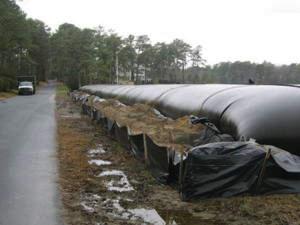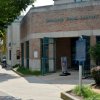School board to vote on Silver Lake dredging project
Cape school board members are satisfied that a proposed dredging project at Silver Lake is not likely to cause contamination at Rehoboth Elementary School.
"I feel a lot more comfortable that this is not so much a clean up of contaminants," said board President Andy Lewis, following a meeting Jan. 10 with state officials.
A final vote to approve the Department of Natural Resources and Environmental Control project, which would place 10 Geotube containers on Rehoboth Elementary's property holding sediment dredged from Silver Lake, is tentatively set for the Jan. 24 school board meeting.
Questions during the Jan. 10 school board meeting concerned potential contamination to school property.
Sediment dredged from the lake would be pumped into Geotubes – enclosed synthetic containers that are 100-feet long and 35-feet in diameter. The tubes would be placed in a fenced area in the southeast corner of school property.
Lewis questioned the relevancy of a contaminant report completed five years ago to the level of contaminants that could be in the lake today.
Those levels, however, are in parts per billion and are not a risk, said Chuck Williams, project manager for the division of soil and water conservation.
"I don't believe the levels will be different from what they were five years ago," he said.
The Geotubes are made of heavy, manmade material designed to hold sediment pumped out of the north arm of Silver Lake. The dredging is necessary to remove years of sediment build-up that is affecting the health of the lake, Williams said.
The tubes would contain the sediment and allow lake water to drain back into the lake; the dried sediment would be trucked away to be used as fertilizer or landfill in about a year's time.
Williams said a liner placed under the tubes should be sufficient to prevent sediment from leaking onto the playground. If a tube were to rupture, DNREC would address it immediately, he said.
"This is not considered by us to be any type of remediation of contaminant materials that pose a threat," said Frank Piorko, director of watershed stewardship for DNREC.
Piorko said DNREC will move forward on the project, which involves contacting people living near the proposed work. A public hearing for neighbors will be held shortly after DNREC receives school board approval.
Melissa Steele is a staff writer covering the state Legislature, government and police. Her newspaper career spans more than 30 years and includes working for the Delaware State News, Burlington County Times, The News Journal, Dover Post and Milford Beacon before coming to the Cape Gazette in 2012. Her work has received numerous awards, most notably a Pulitzer Prize-adjudicated investigative piece, and a runner-up for the MDDC James S. Keat Freedom of Information Award.

















































